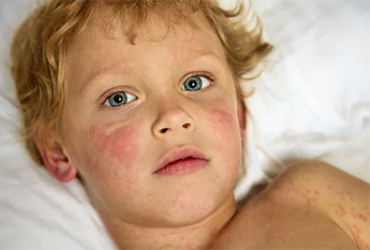By IDSE News Staff
A study in children and adolescents who received a COVID-19 vaccination following multisystem inflammatory syndrome in children (MIS-C) found no reports of serious complications, including myocarditis or MIS-C recurrence.
About half of participants experienced mild and typical reactions after vaccination, including arm soreness and fatigue, the researchers said (JAMA Netw Open 2023;6[1]:e2248987. doi:10.1001/jamanetworkopen.2022.48987).

The multicenter, observational study—the largest of its kind to examine COVID-19 vaccination in this age group—helps resolve a lingering question about whether the vaccine could increase the risk for health problems in young people who have had MIS-C, a rare and potentially fatal immunological reaction that can occur following infection with SARS-CoV-2.
MIS-C is a poorly understood condition that affects one in about 3,000 to 4,000 children and adolescents after a COVID-19 infection, which can lead to organ failure. Symptoms can range from stomach pain, fever and rash to myocarditis, according to the CDC. The exact causes of MIS-C are unknown, but medications can be given to decrease the inflammation that can damage organs.
The researchers conducted the study because some families and health professionals have questioned whether COVID-19 vaccines could lead to more serious adverse reactions in recipients with a history of MIS-C.
The cross-sectional study included 22 medical centers (21 in the United States and one in Canada) participating in the MUSIC (Long-Term Outcomes After the Multisystem Inflammatory Syndrome in Children) study. It enrolled 385 patients 5 years of age or older, with prior MIS-C who were eligible for COVID-19 vaccination. Of this group, 185 (48.1%) received at least one vaccine dose. The median age was 12.2 years and 73.5% were male. The participants were racially diverse—24.3% were Black, 31.9% were Hispanic and 28.6% were white. The median length of time from their MIS-C diagnosis to their first vaccine dose was nine months.
Of participants who received a COVID-19 vaccination following MIS-C, mild adverse reactions—mostly arm soreness and fatigue—occurred in 49%, similar to the general population. There were no reports of serious complications, including myocarditis or recurrence of MIS-C, the researchers said, who have routinely treated children with MIS-C throughout the pandemic.
“We are very reassured by the results, and this safety data should be comforting to families and healthcare professionals when considering and recommending vaccination,” said study co-leader Matthew D. Elias, MD, a pediatric cardiologist at Children's Hospital of Philadelphia and a clinical assistant professor of pediatrics at the University of Pennsylvania, in Philadelphia.
Dr. Elias told Infectious Disease Special Edition that it’s reassuring that many children have only mild symptoms when they have COVID-19, but cautioned there is a risk for children ending up with severe disease, and they can die from COVID-19.
“It’s also important for families to know that children can have mild COVID-19 illness but then present extremely sick a month later with MIS-C. Vaccinations help to prevent these serious complications, including MIS-C,” he said.
Audrey Dionne, MD, a pediatric cardiologist at Boston Children's Hospital and an assistant professor of pediatrics at Harvard Medical School, in Boston, also served as the study's co-leader. She has routinely treated children with MIS-C throughout the pandemic.
“Although MIS-C is a relatively rare complication, children affected can be very sick and need to be admitted to the intensive care unit for multiple days,” Dr. Dionne told Infectious Disease Special Edition. “It represented a significant burden in pediatrics during the pandemic. The burden has been less recently, in part due to the lower number of COVID cases, but also COVID-19 vaccination—[as it] has been shown to be protective for MIS-C.”
Dr. Dionne added that the findings provide support for the CDC's recommendation that patients with a history of MIS-C receive a COVID-19 vaccine at least 90 days after diagnosis, and that it is safe to do so.
“In light of the acute and long-term consequences of COVID-19, it is vital to continue the development, testing and deployment of preventive as well as therapeutic agents in at-risk groups, as well as the general population,” said Gary H. Gibbons, MD, the director of the National Heart, Lung, and Blood Institute (NHLBI), part of the National Institutes of Health (NIH), in Bethesda, Md.
To date, more than 9,000 people have been diagnosed with MIS-C in the United States, and 74 have died, according to data from the CDC. However, the disease appears to be declining, according to studies by others.
“A big part of that decline is that COVID vaccination has been protective against this rare condition in those who have received it,” Dr. Dionne said. “I recommend the COVID-19 vaccine for all patients eligible. It was shown to reduce the risk of COVID-19 infection and severe complication, even though children are at lower risk of complication than older adults. The risk of MIS-C can be significantly reduced with vaccination.”
Although many patients with MIS-C make a full clinical recovery, some studies suggest chronic symptoms linger after MIS-C, which is why long-term outcome studies will be beneficial, the researchers said. The MUSIC study is part of an NIH collaborative research effort called CARING for Children with COVID, which aims to better understand how COVID affects children, who account for roughly 13% of the total cases in the United States.
Research reported in this study was funded by the NHLBI's MUSIC study and uses the research infrastructure of the Pediatric Heart Network, a pediatric cardiology research consortium funded by the NHLBI, and its data coordinating center, HealthCore Inc.
Drs. Dionne and Elias reported no relevant financial disclosures.




